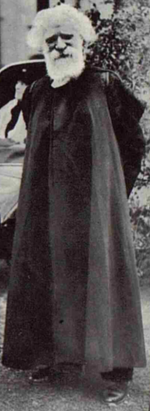
Josiah Oldfield

Josiah Oldfield | |
|---|---|
 Portrait from Fifty Years of Food Reform | |
| Born | 28 February 1863 Shrewsbury, England |
| Died | 2 February 1953 (aged 89) Doddington, Kent, England |
| Alma mater | |
| Occupations |
|
| Spouse |
Gertrude Hick
(m. 1899, separated) |
| Children | 2 |
| Military career | |
| Allegiance | |
| Service | Royal Army Medical Corps |
| Unit |
|
| Conflict | |
| Awards | Territorial Decoration |
Josiah Oldfield TD MRCS LRCP (28 February 1863 – 2 February 1953) was an English lawyer, physician, activist, and writer. He promoted his own variant of fruitarianism, which was virtually indistinguishable from lacto-ovo vegetarianism. Oldfield was a prolific writer of popular books on dietary and health topics.[1] He also served in the Royal Army Medical Corps and received the Territorial Decoration for his service in World War I.

Biography
Early life and education
The son of David Oldfield of Ryton, Shropshire, a provision dealer, and his wife Margaret Bates, he was born on 28 February 1863 in Shrewsbury.[1][2][3] His father, who died in 1903, was a church organist in nearby Condover from around the time of Josiah's birth.[4][5]

Oldfield was educated at Newport Grammar School.[6] He then taught as an assistant master at Chipping Campden School.[7][8]

Matriculating in 1882 at the University of Oxford as a non-collegiate student, Oldfield graduated B.A. in 1885, with second-class honours in civil law and theology.[2][3] While there, he became a vegetarian and concluded meat-eating was unnecessary.[2] He was called to the bar by Lincoln's Inn, and practised as a barrister on the Oxford court circuit.[2] He then studied medicine at St. Bartholomew's Hospital Medical School and qualified in 1897.[2]

Activism
Vegetarianism
Oldfield was President of the West London Food Reform Society, a vegetarian group based in Bayswater, founded in 1891.[9] Edwin Arnold was vice-president and Mohandas Gandhi was Secretary.[10] Oldfield met Gandhi through Pranjivan Mehta, in 1890, and the two became friends, sharing rooms in Bayswater for some months in 1891.[11]

Further, Oldfield was associated with the London Vegetarian Society (LVS) and editor for their publication, The Vegetarian.[12] He was also the secretary of the Vegetarian Federal Union.[13] He was a member of the Order of the Golden Age and the Humanitarian League.[13][14]

In 1895, Oldfield searched for alternatives to leather for boots, experimenting with boots made from India rubber, gutta-percha, and asbestos. He found faults with all of those substances, but expressed optimism about a "vegetarian" boot.[15] That year he submitted a paper on vegetarian boots to the autumn congress of the Vegetarian Federal Union held in Birmingham.[16]

In the early 1900s, Oldfield became disillusioned with the term vegetarianism. In 1907, he commented that "some people imagine that I am a vegetarian and that my opinion, therefore, on the question of food is warped by a certain faddism. Now, this is untrue. I am not a vegetarian and have no connection with any vegetarian society."[17]

The entry "Vegetarianism" in the Encyclopædia Britannica (11th edition, 1911) was written by Oldfield; but he did not identify as a vegetarian. He stated that "I object absolutely to vegetarianism, because the word smacks of onions and cabbage. It gives people the idea that you live on watercress and browse on odds and ends of garbage."[18] He identified himself as Aristophagist, which he described as "eaters of the best - men and women who refuse to eat the common garbage of the undeveloped."[19]

Fruitarianism
Oldfield advocated for fruitarianism, putting him at odds with the Vegetarian Society.[18] He was a member of the Fruitarian Society, whose members lived on "the produce of harvest field, garden, forest and orchard, with milk, butter, cheese, eggs and honey".[6] His own "fruitarianism" was close to ovo-lacto vegetarianism. He was not a vegan: he recommended a daily diet of dandelion leaves, eggs, grapes, honey, lettuce, milk, salad, and watercress.[20] He opposed slaughterhouses and vivisection.[21]

A reviewer in 1909 noted that "as fruitarian dietary includes milk, butter, eggs, cheese, and honey, along with fruits, nuts, and vegetables, healthy existence is quite possible for Dr Oldfield and his followers."[22] A recipe of his "Margaret Plum Pudding" was included in Cecilia Maria de Candia's cookbook, The Kitchen Garden and the Cook (1913).[23] In 1931, Oldfield commented that "I am proud to say that the only point on which we of the Fruitarian Society disagree with Mr. Gandhi is that Mr. Gandhi will not eat eggs, because they contain Life."[24] In 1949, he said that "as a scientist I am a fruitarian, and live on the kindly fruits of the earth which include eggs, milk, butter, cheese and honey".[25]

Hospital founder
While he was a medical student, Oldfield was involved with the Oriolet Hospital, founded in 1895 in Loughton, Essex. It required vegetarianism of its patients.[26] The hospital was endorsed by the Order of the Golden Age, and partly funded by Arnold Hills. Oldfield admitted patients there, initially employed with title Warden, supported by a medical officer.[7][27] Gertrude Hick, the nurse whom Oldfied later married, was trained in London and appointed sister in charge at the hospital in early 1895.[28] By 1904 it had become the Oriolet Hygienic Home of Rest and Open Air Cottage Hospital, run by Florence Booth for the Salvation Army.[29]

In 1897 Oldfield announced the foundation of the Hospital of St Francis in South London, on anti-vivisection principles. It had up to a dozen beds, in a converted town house on New Kent Road, and gave out-patient care. It closed around 1904, its funding being transferred to Battersea General Hospital.[30][31] Oldfield was senior physician to the Lady Margaret Fruitarian Hospital in Bromley, which he founded in 1903.[2][32] No alcohol, fish or meat was permitted at the hospital; the food was cooked in coconut oil.[33] In 1914, Oldfield stated that "nothing is brought within the walls of the hospital that is dead; and as a result very little that is dead goes out".[34]

Lady Margaret Manor
In 1908, Oldfield founded the fruitarian Margaret Manor hospital in Doddington, Kent.[32][35][36] The hospital at Lady Margaret Manor was located on an extensive farm estate surrounded by acres of woodland. The estate also included an orphanage and workshop.[37] Lady Margaret Manor was known as the "Fruitarian Village".[36]

In 1933, Oldfield's cottage at Doddington was burnt down. His entire library was destroyed.[38] Oldfield who was present in the cottage downstairs at the time of the fire stated that a log must have fallen out of the fireplace onto the carpet upstairs.[38]

In 1935, Oldfield founded a fruitarian colony for retired men at Lady Margaret Manor.[39] The men worked within the grounds of the manor growing vegetables, milking cows and working in the woodland.[40] The estate consisted of 13 men who were provided with food, lodging and pocket money. Several of the men were over 77 years of age and one of them was a war-wounded expert at wood carving.[39] The men had built a small chapel in the grounds. It was described as a "wood Kentish paradise" for old men.[39]

Army surgeon

Oldfield shared the pacifist views of the Order of the Golden Age.[41] In 1898, he joined the Essex Regiment, 1st Volunteer Battalion as an Army Surgeon with the rank of Lieutenant, serving to 1901.[7] He later in 1913, with rank of Major, criticised the absence of standard training for Regimental Medical Officers of the Territorial Army.[42][43] During World War I, he held a commission as Lieutenant-Colonel of the 3rd East Anglian Field Ambulance Corps, a Territorial in the Royal Army Medical Corps,[2] raising and commanding a casualty clearing station that served at the Western Front, for which he was mentioned in despatches.[1] His service came to an end in 1918, when he was thrown from a horse. He was awarded the Territorial Decoration.[2][41][44]

Legal reformer
In 1901, the University of Oxford awarded Oldfield a doctorate in civil law for his thesis on capital punishment.[2] The Penalty of Death, it combined criminological, legal and sociological arguments to call for abolition of the death penalty.[45] He founded the Society for the Abolition of Capital Punishment in the same year.[2] He became chairman of the Romilly Society, a pressure group for penal reform founded in 1897, in 1910.[46][1]

India
Oldfield subscribed to Catherine Impey's periodical Anti-Caste.[47] He made an investigative visit to India in 1901.[1] His personal connections to India included contacts in Kathiawar. This was the home area of his friend Gandhi, born at Porbandar;[48] and best man at his wedding in 1899 was Trimbakrai Jadavrai Desai, then a law student at Gray's Inn in London, from Limbdi State of the Kathiawar Agency.[49] His experiences formed the material of a series of articles in The Leisure Hour. One of them related to Bhavnagar State in eastern Kathiawar, and a visit where he was accompanied by Prabhashankar Pattani.[50][51] In April 1903 Oldfield published in the Hibbert Journal an article "The Failure of Christian Missions in India".[52]

Later life and death
Oldfield became a fellow of the Royal Society of Medicine in 1920.[1] He died in 1953 at the age of 89, in Doddington, Kent.[6]

Views

In 1891, Oldfield attempted to convert Gandhi to Anglicanism, urging him to read the Bible.[9] By the 20th century he had changed his own views. In 1904, he commented that "as a medical man, seeing much of pain and suffering and dying, my experience does not lead me to think that it is the profession of the Christian creed which is by any means the sole method of securing happiness of soul in this world, or which removes the fear of passing on to the next."[53]

Oldfield concluded that a "wider conception of God" was needed.[53] He is listed in A Biographical Dictionary of Modern Rationalists as a theist with mystic ideas about the soul.[54] He was a proponent of evolution conceived as based on cooperation rather than competition.[21]

Oldfield argued that meat was a main cause of disease.[55] He was not a teetotaller as he promoted home-brewed ale.[56] He argued that the vitamins in the barley of home-brewed ale are responsible for the stamina of the English people.[57] In 1945, Oldfield commented that there "is no reason at all from the medical point of view" why a man should not get drunk once a month.[58]

Selected publications
- Tuberculosis: Or Flesh Eating a Cause of Consumption (1897)
- The Penalty of Death: Or, the Problem of Capital Punishment (1901)
- Essays of the Golden Age (1902)
- The Penny Guide to Fruitarian Diet and Cookery (1902)
- Myrrh and Amaranth (1905)
- The Value of Fruit as Food (1906)
- . . Vol. 27 (11th ed.). 1911.
- The Raisin Cure (1923)
- Fasting for Health and Life (1924)
- The Dry Diet Cure (1925)
- Get Well and Keep Well (1926)
- Eat and Get Well (1927)
- Eat and Keep Young (1928)
- Eat and Be Happy (1929)
- Healing and the Conquest of Pain (1944)
- The Mystery of Birth (1949)
- My Friend Gandhi (Reminiscences of Gandhiji, 1951)
- The Mystery of Death (1951)
- A Popular Guide to Fruitarian Diet and Cookery (1952)
Quotes
Flesh is an unnatural food and, therefore, tends to create functional disturbance. As it is taken in modern civilization, it is affected with such terrible diseases (readily communicable to man), as cancer, consumption, fever, intestinal worms etc., to an enormous extent. There is little need to wonder that flesh-eating is one of the most serious causes of the diseases that carry off ninety-nine out of every hundred people that are born.
— Josiah Oldfield, in 1902[59]
Family
Oldfield married Gertrude Hick on 29 September 1899 at Wakefield Cathedral; she was the daughter of Matthew Bussey Hick of Wakefield, and sister of the doctor Henry Hick. They had twin daughters in 1902; but their marriage was not successful and they separated.[6][60] He had two daughters named Josie: Josie Margaret Oldfield, with Irene Doreen Oldfield one of the twins; and Josie Magdalen Oldfield, born 1906 and identified in the 1911 census.[7] The latter, a cradle fruitarian, was qualified medically from 1933.[61]

See also
References
- ^ a b c d e f Smith, Virginia. "Oldfield, Josiah (1863–1953)". Oxford Dictionary of National Biography (online ed.). Oxford University Press. doi:10.1093/ref:odnb/40999. (Subscription or UK public library membership required.)
- ^ a b c d e f g h i j "Josiah Oldfield, D.C.L., M.R.C.S." The British Medical Journal. 1 (4806): 407–407. 1953. ISSN 0007-1447.
- ^ a b Foster, Joseph (1888–1892). . Alumni Oxonienses: the Members of the University of Oxford, 1715–1886. Oxford: Parker and Co – via Wikisource.
- ^ "Ryton, Dorrington". Wellington Journal. 2 May 1903. p. 11.
- ^ "Doddington: Death of Miss Oldfield". Faversham News. 3 December 1943. p. 4.
- ^ a b c d The Gissing Journal, Volume XLIII. (January 2007). pp. 29–30
- ^ a b c d Josiah Oldfield on Lives of the First World War
- ^ Dr. Josiah Oldfield, Founder of 'The Campdonian' Magazine. Chipping Campden School. Retrieved 8 January 2020.
- ^ a b Wolpert, Stanley. (2001). Gandhi's Passion: The Life and Legacy of Mahatma Gandhi. Oxford University Press. p. 22. ISBN 0-19-513060-X
- ^ Gandhi, Rajmohan. (2008). Gandhi: The Man, His People, and the Empire. University of California Press. p. 42. ISBN 978-0-520-25570-8
- ^ Gandhi, Rajmohan (10 March 2008). Gandhi: The Man, His People, and the Empire. University of California Press. p. 38. ISBN 978-0-520-25570-8.
- ^ Gregory, James Richard Thomas Elliott (2002). "Biographical Index of British Vegetarians and Food reformers of the Victorian Era". The Vegetarian Movement in Britain c.1840–1901: A Study of Its Development, Personnel and Wider Connections (PDF). Vol. 2. University of Southampton. Retrieved 2 October 2022.
- ^ a b Weinbren, Dan (1994). "Against All Cruelty: The Humanitarian League, 1891-1919". History Workshop (38): 86–105. ISSN 0309-2984. JSTOR 4289320.
- ^ Bates, A. W. H. (2017). Anti-Vivisection and the Profession of Medicine in Britain: A Social History. Palgrave Macmillan. p. 72. ISBN 978-1-137-55696-7
- ^ Oldfield, Josiah. (1895). Is There Nothing Like Leather? Some Experiments with Vegetarian Boots. Vegetarian Review. pp. 401-403.
- ^ "Vegetarian Federal Union 1889-1911". International Vegetarian Union. Retrieved 20 August 2021.
- ^ "The Value of Fruit as Food". trove.nla.gov.au. Retrieved 4 November 2023.
- ^ a b "Fruitarian Society Feature". The Order of the Golden Age. Retrieved 8 January 2020.
- ^ Oldfield, Josiah. "The Herald of the Golden Age" (PDF). Order of the Golden Age. Archived from the original (PDF) on 25 October 2021.
- ^ Dandelions for Health. The Popular Science Monthly, 1920.
- ^ a b Preece, Rod (25 October 2011). Animal Sensibility and Inclusive Justice in the Age of Bernard Shaw. UBC Press. p. 189. ISBN 978-0-7748-2112-4.
- ^ Chambers's Journal. W. & R. Chambers. 1909. p. 514.
- ^ De Candia, Cecilia Maria. (1913). The Kitchen Garden and the Cook. London. p. 235
- ^ "Foreign News: Royal Tea". Time. Retrieved 8 January 2020.
- ^ "What Shall A Man Eat?". Western Mail. 3 May 1949. p. 4. (subscription required)
- ^ "A Vegetarian Hospital". Morning Post. 20 September 1897. p. 2.
- ^ Bates, A. W. H. (24 July 2017). Anti-Vivisection and the Profession of Medicine in Britain: A Social History. Springer. pp. 73–74. ISBN 978-1-137-55697-4.
- ^ "Reflections from a Board-Room Mirror". The Nursing Record and Hospital World. 14: 223. 6 April 1895.
- ^ Burdett, Sir Henry C. (1904). Burdett's Hospitals and Charities: Being the Year Book of Philanthropy. Scientific Press. p. 660.
- ^ Bates, A. W. H. (24 July 2017). Anti-Vivisection and the Profession of Medicine in Britain: A Social History. Springer. pp. 75–80. ISBN 978-1-137-55697-4.
- ^ Kean, Hilda (August 1998). Animal Rights: Political and Social Change in Britain Since 1800. Reaktion Books. p. 248 note 87. ISBN 978-1-86189-014-6.
- ^ a b "Oldfield, Dr Josiah (case 20178) Warden of Oriolet Hospital, Loughton, Essex (vegetarian): document file and key file". The National Archives. Retrieved 8 January 2020.
- ^ Guha, Ramachandra. (2013). Gandhi Before India. Penguin India. p. 38
- ^ "Novel Hospital: Into Which No Meat Is Admitted". The Liverpool Echo. 27 May 1914. p. 6. (subscription required)
- ^ "No.13 Lady Margaret Manor". Doddington Kent. Archived from the original on 10 August 2024.
- ^ a b "Lady Margaret Hospital". Lost Hospitals of London. 2014. Archived from the original on 5 December 2023.
- ^ "How Aged Doctor Made a New World Out of the Old Farm". Reynolds's Illustrated News. 1 September 1935. p. 19. (subscription required)
- ^ a b "Dr. Oldfield in Fire Drama". The Daily Mirror. 28 November 1933. p. 15. (subscription required)
- ^ a b c "Mansion Home for Old Men on Scrap Heap". The Daily Mirror. 21 September 1935. p. 4. (subscription required)
- ^ "How Old is an Old man?". Weekly Illustrated Magazine. 28 September 1935.
- ^ a b Bates, A. W. H. (24 July 2017). Anti-Vivisection and the Profession of Medicine in Britain: A Social History. Springer. ISBN 978-1-137-55697-4.
- ^ Whitehead, Ian R. (14 November 2013). Doctors in the Great War. Pen and Sword. p. 155. ISBN 978-1-78346-174-5.
- ^ Medicine and Modern Warfare. Brill. 29 August 2016. p. 166. ISBN 978-90-04-33327-7.
- ^ Twigg, Julia. "The Vegetarian Movement in England 1847-1981". ivu.org.
- ^ Pittard, Christopher. (2019). Grant Allen's “Jerry Stokes”: Detective Fiction, the Death Penalty, and the Scene of Writing. Victorian Periodicals Review 52 (2): 235–254.
- ^ Garland, David (30 January 2018). Punishment and Welfare: A History of Penal Strategies. Quid Pro Books. p. 149. ISBN 978-1-61027-378-7.
- ^ Bressey, Caroline (October 2012). "Reporting oppression: mapping racial prejudice in Anti-Caste and Fraternity, 1888–1895". Journal of Historical Geography. 38 (4): 408. doi:10.1016/j.jhg.2012.04.001.
- ^ Majmudar, Uma (1 February 2012). Gandhi's Pilgrimage of Faith: From Darkness to Light. SUNY Press. p. 25. ISBN 978-0-7914-8351-0.
- ^ "A Wakefield Wedding". Sheffield Independent. 30 September 1899. p. 9.
- ^ The Leisure Hour. Vol. 51. Open Court Publishing Co. July 1902. pp. 778–781.
- ^ Shaw, Albert (1902). The Review of Reviews. Vol. 26, July - December 1902. p. 54.
- ^ Rolleston, Thomas William Hazen (1934). Parallel Paths: A Study in Biology, Ethics, and Art. Library of Alexandria. p. 201. ISBN 978-1-61310-877-2.
- ^ a b Courtney, William Leonard. (1905). Do We Believe? A Record of a Great Correspondence in "The Daily Telegraph: October, November, December, 1904. London: Hodder and Stoughton.
- ^ McCabe, Joseph. (1920). A Biographical Dictionary of Modern Rationalists. London: Watts & Co. p. 566
- ^ Doctor Claims Right Diet is Need of World. The Morning Leader (February 26, 1921). p. 2
- ^ Hanley's Peerless Ale. Fall River Globe (May 19, 1906). p. 7
- ^ Doctor Calls Home Brew Essential to Long Life. Reading Eagle (May 17, 1923). p. 16
- ^ Sees No Harm in Man Getting Roaring Drunk. The Calgary Herald (April 5, 1945). p. 12
- ^ "The Vegetarian and Our Fellow Creatures". The Vegetarian Magazine. 6 (8): 181. 1902.
- ^ Coustillas, Pierre (30 September 2015). The Heroic Life of George Gissing, Part I: 1857–1888. Routledge. p. 17. ISBN 978-1-317-30409-8.
- ^ "n/a". Fife Free Press, & Kirkcaldy Guardian. 4 February 1933. p. 12.
External links
- Dr. Josiah Oldfield (The Order of the Golden Age)
- Lady Margaret Hospital (Lost Hospitals of London)
- Josiah Oldfield at the Imperial War Museum
- 1863 births
- 1953 deaths
- 19th-century English lawyers
- 19th-century English medical doctors
- 20th-century English lawyers
- 20th-century English medical doctors
- Alumni of the Medical College of St Bartholomew's Hospital
- Alumni of the University of Oxford
- British anti–death penalty activists
- English anti-vivisectionists
- British Army personnel of World War I
- English vegetarianism activists
- English animal rights scholars
- English food writers
- English medical writers
- English pacifists
- Fellows of the Royal College of Physicians
- Fellows of the Royal College of Surgeons of England
- Medical doctors from Shrewsbury
- Members of Lincoln's Inn
- People associated with the Order of the Golden Age
- People associated with the Vegetarian Society
- People educated at Newport Free Grammar School
- People from Doddington, Kent
- Writers from Shrewsbury
- Vegetarian cookbook writers
- Vegetarianism writers
- 19th-century English male writers
- 20th-century English male writers
- English male non-fiction writers
- Lawyers from Shropshire
- Writers from Shropshire
- Essex Regiment officers
- Royal Army Medical Corps officers
See what we do next...
OR
By submitting your email or phone number, you're giving mschf permission to send you email and/or recurring marketing texts. Data rates may apply. Text stop to cancel, help for help.
Success: You're subscribed now !

